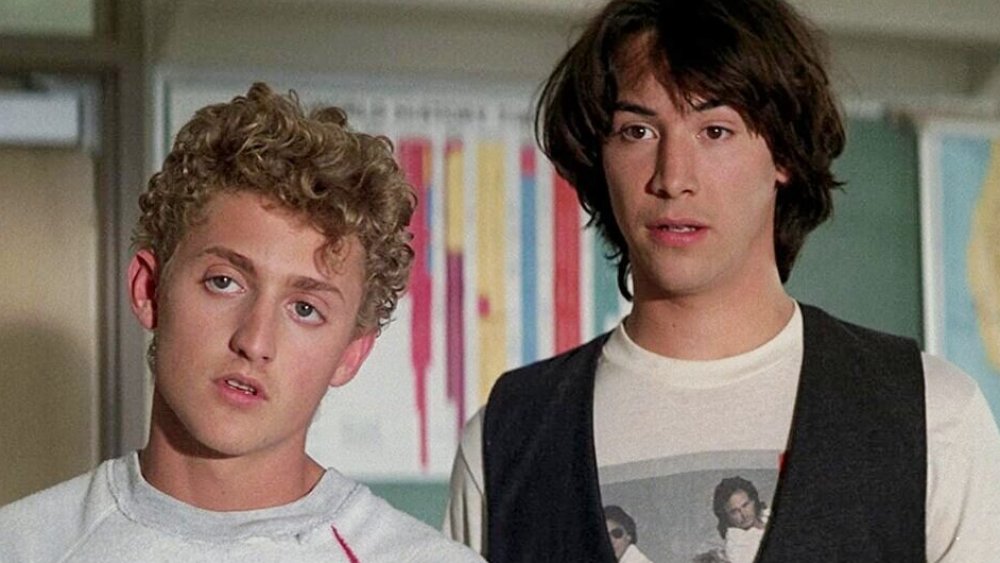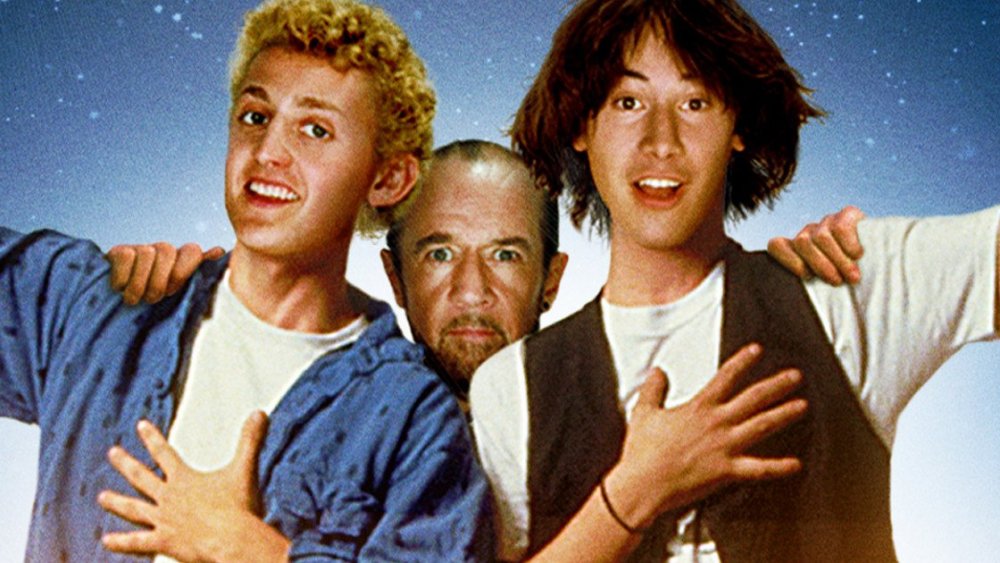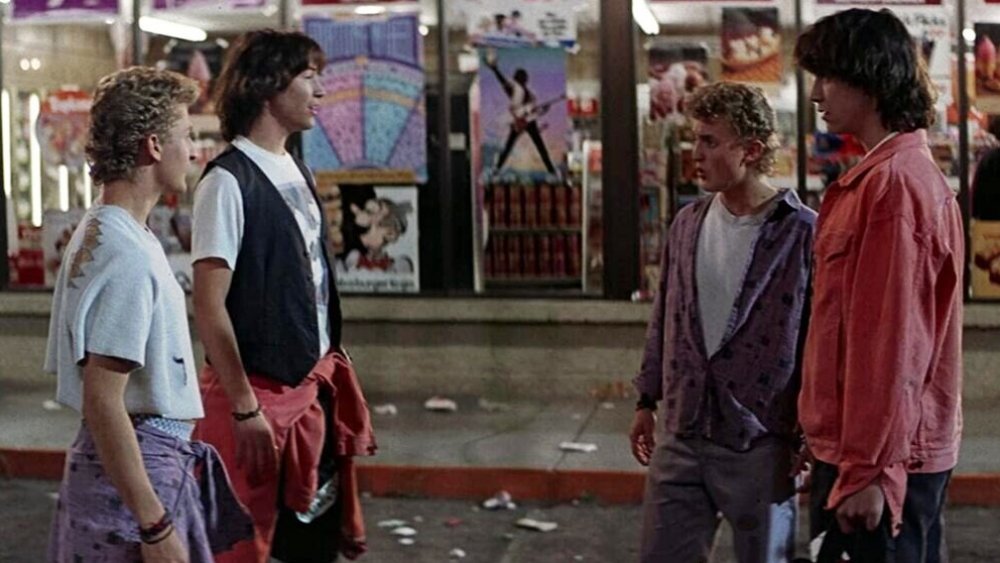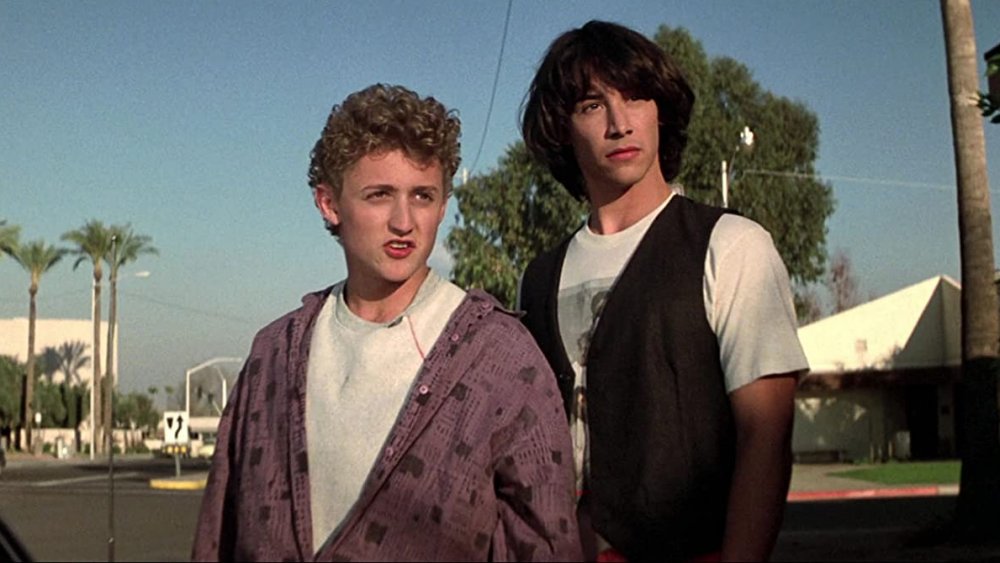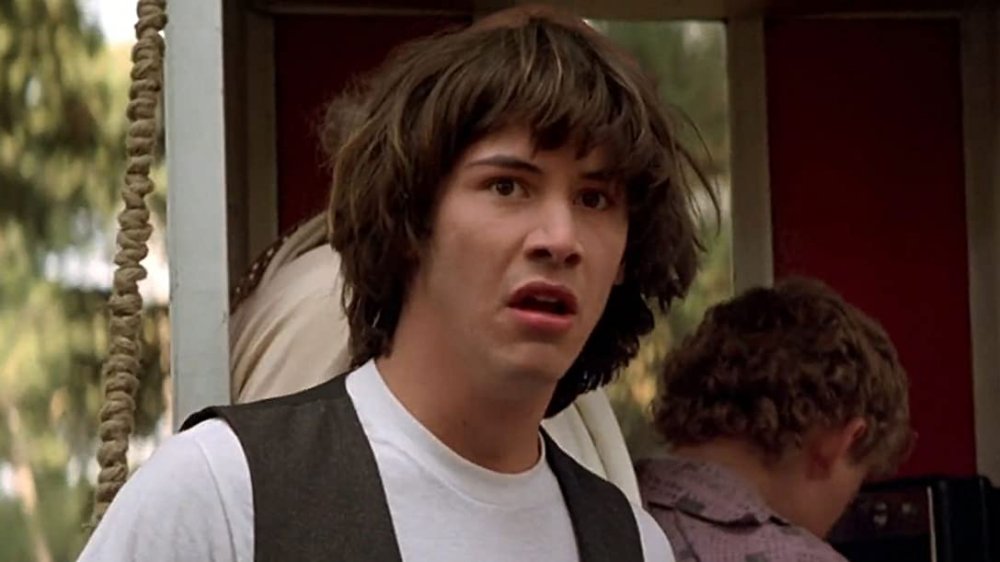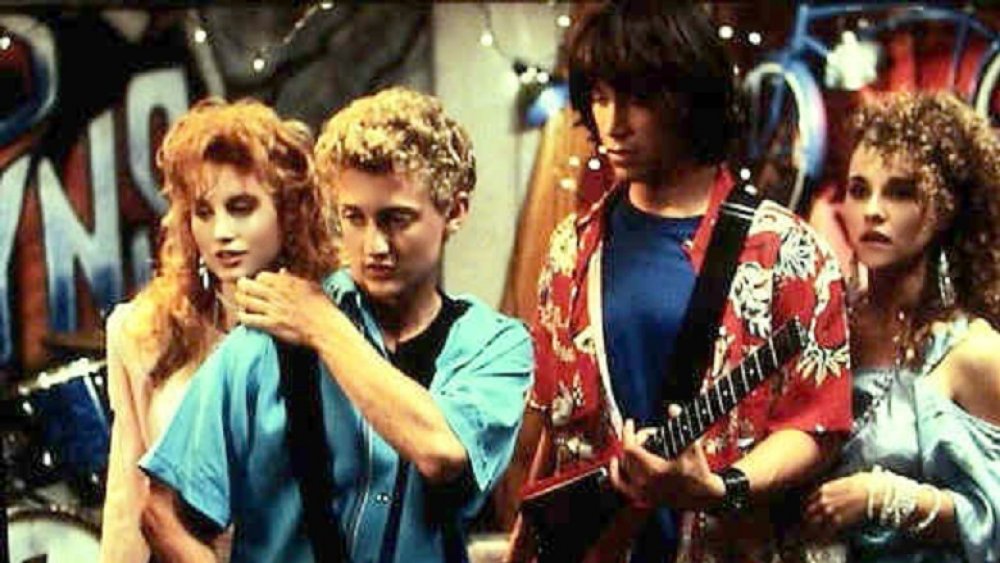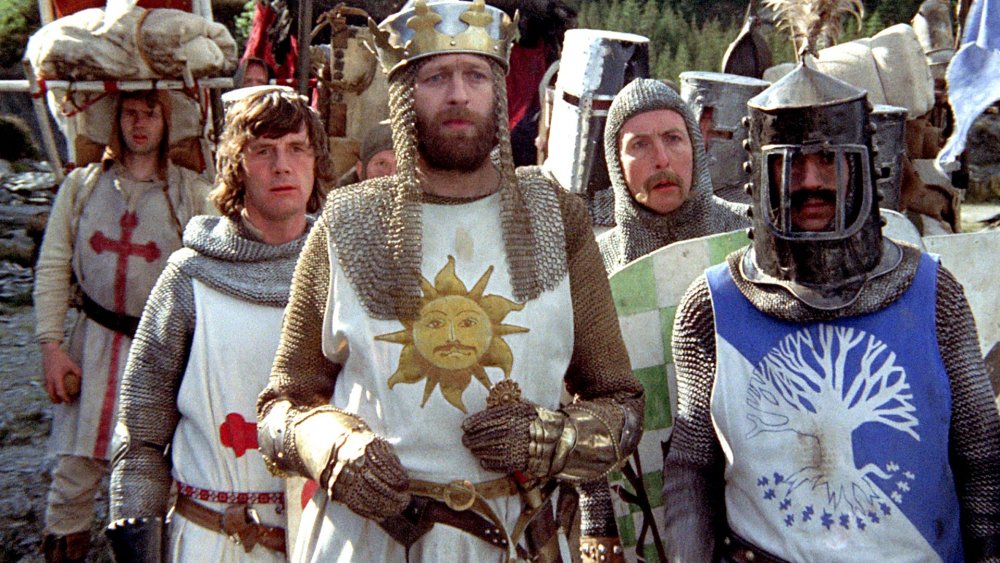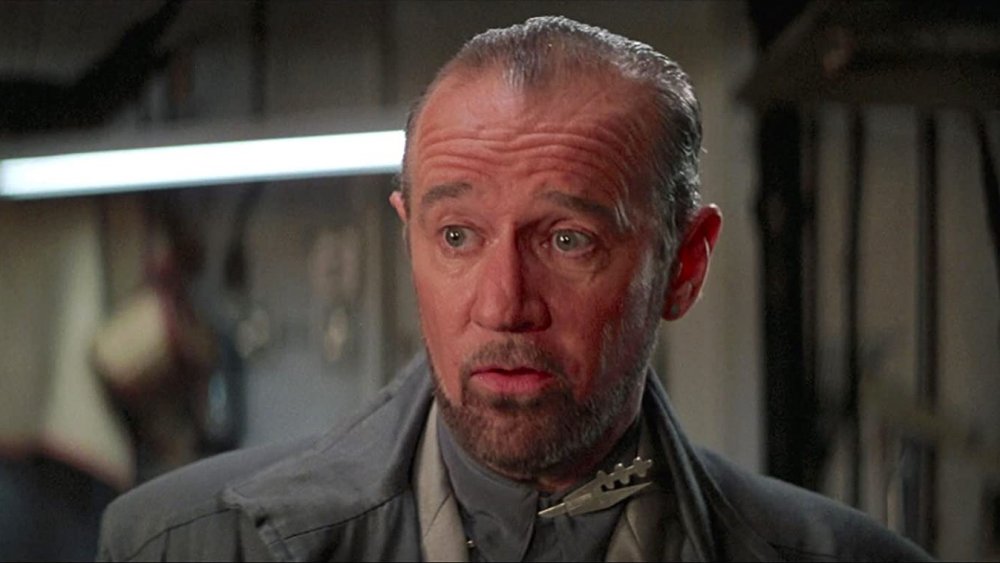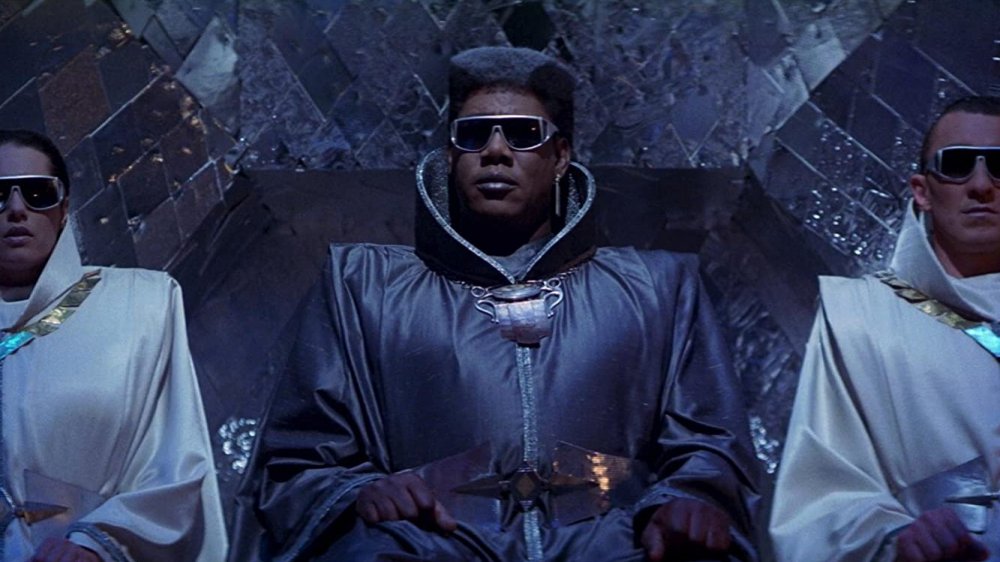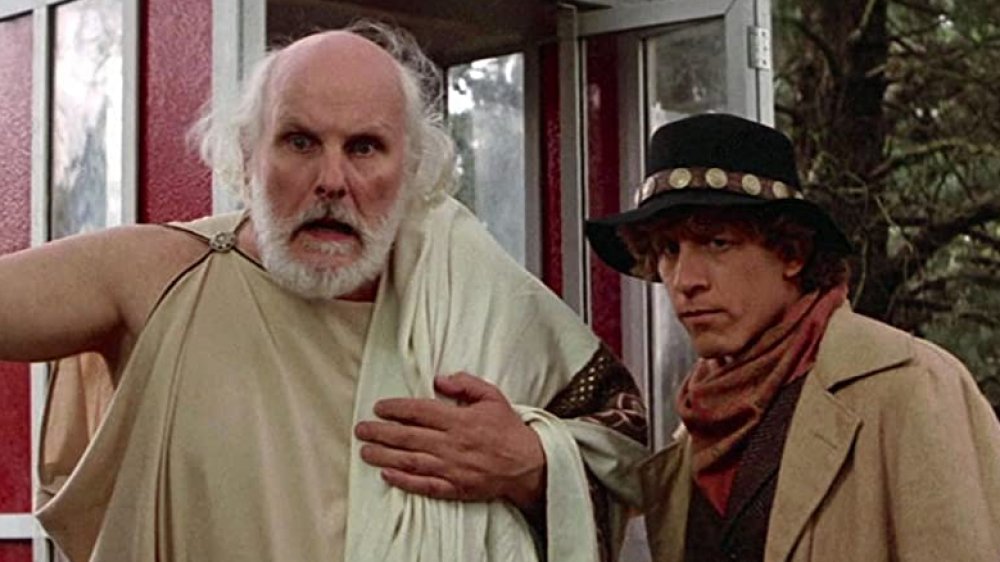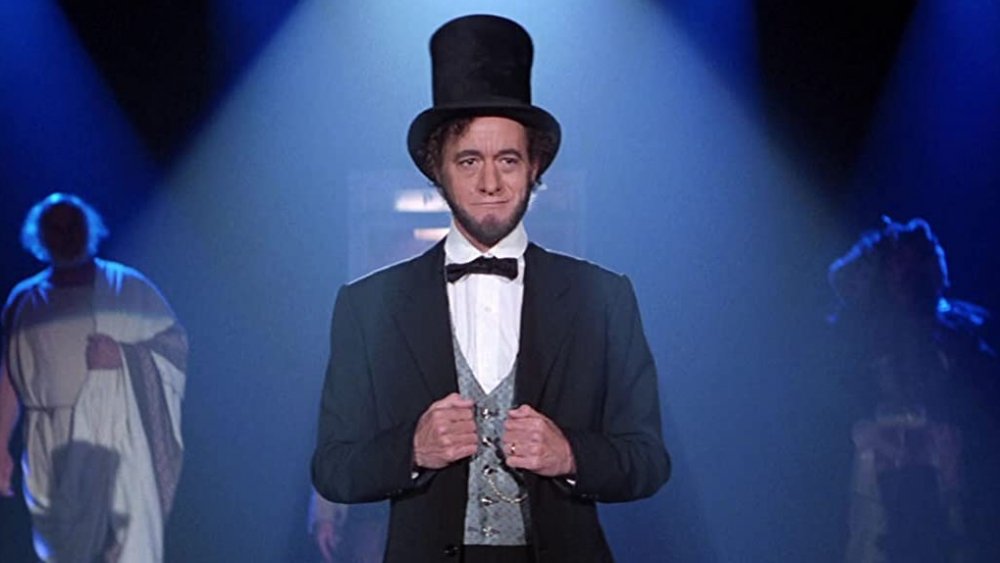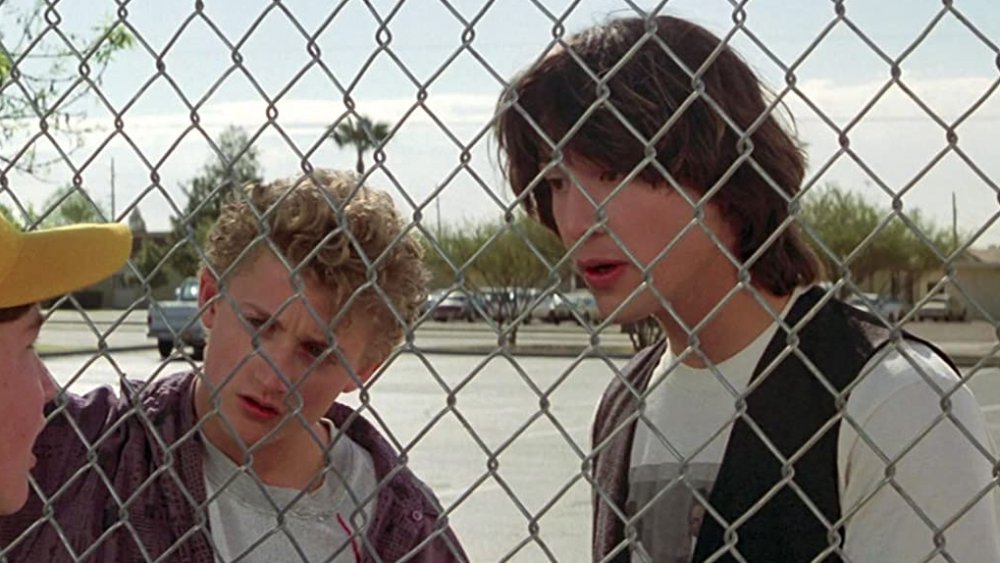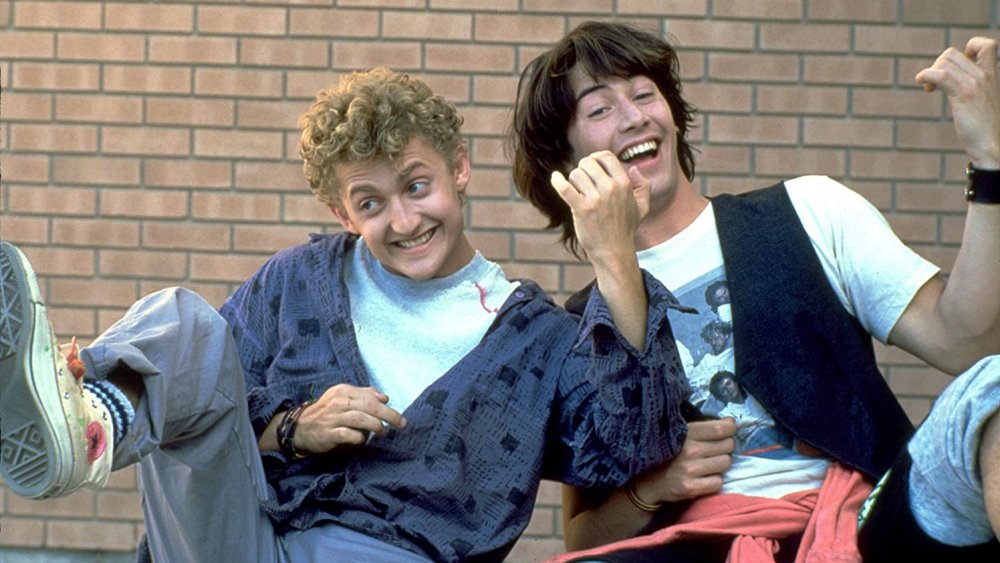Movie Facts About Bill & Ted's Excellent Adventure
Four score and a few years ago, our friends Bill S. Preston, Esq., and Ted "Theodore" Logan brought us forth on a most excellent adventure. It was the notion of a couple of righteous dudes, screenwriters Ed Solomon and Chris Matheson, that their adventure could inspire all of us to laugh, and maybe to learn a little bit about the power of friendship, the importance of diligence and dedication, and the extreme awesomeness of Edward Van Halen. They never guessed that we'd still be talking about their little film, Bill and Ted's Excellent Adventure, over 30 years later — and anxiously awaiting the return of Bill (Alex Winter) and Ted (Keanu Reeves) in a brand new feature.
The 1989 film hit a number of potential snags on the way to the big screen, but it somehow seemed to always right itself, almost as if the filmmakers had the opportunity to go back in time to pre-emptively fix what might have gone wrong. You may be able to quote three-quarters of the movie — but if you never knew its original title, who the filmmakers wanted (but were unable to get) for key roles, or how the flick almost ended, then you're in the right place. (And time.) Here are some things you never knew about Bill and Ted's Excellent Adventure.
The characters originated in a comedy bit by the writers
The characters of Bill and Ted didn't present themselves to Solomon and Matheson like a bolt out of the blue; they were developed out of the time that the two buddies spent as standup comics, plying their trade on the early '80s L.A. improv circuit. They were inspired by the bodacious, if somewhat dim, surfer dudes that they often encountered while wandering around Venice Beach, and their unfiltered style of communication. They created the personas of Bill and Ted as a kind of lark; they would take questions from their standup audiences, and answer to the best of the abilities of their lunkheaded characters. "We were just trying to make ourselves laugh, and make each other laugh," Solomon recalled in a chat with The Independent.
Eventually, the pair had the idea of translating the characters to film, although not quite in the form with which we're familiar. Their initial idea was to send them back through history as well-meaning agents of chaos: "Through sheer bumbling, [they] were responsible for everything bad that ever happened to mankind, including the Plague, world wars, the Titanic," Matheson revealed. While this sounds like a pretty amazing idea, the writer arrived at the conclusion that this story might have gotten a little dark for the lighthearted characters he and Solomon had conceived. Fortunately, the early ideas the duo had about how to bring Bill and Ted to a wide audience were quickly reshaped by a conversation Matheson had with his dad — who just happened to be an absolute legend.
The movie might not have been made if not for a sci-fi legend
Lest you think that's mere hyperbole, we're speaking of the man who literally wrote I Am Legend: Richard Matheson, whose novels changed the horror and sci-fi genres forever (and were a profound influence on the likes of Stephen King), and who wrote many of the best episodes of The Twilight Zone, among a slew of other classic TV series. The younger Matheson admitted to Starlog that he had always tried to shy away from sci-fi elements in his work, for the simple fact that few writers before or since have handled such elements as deftly as his father. "I try to consciously fight it, out of a desire to break away — but maybe I have a predilection toward that because of my dad," Matheson said. "He's a great writer and craftsman, and always has suggestions."
Among those suggestions: the elder Matheson suggested that his son and his buddy were onto something a little bigger than what they had planned for their bumbling duo, whom they had planned to use in a single sketch in one of those comedy anthology flicks like Kentucky Fried Movie and Amazon Women on the Moon which were briefly popular in the '70s and '80s. "My dad said, 'That sounds like a whole movie,'" Chris Matheson recalled. "And he was right!"
It started out with a different title
As the writers fleshed out their idea, it initially took shape just a little differently from the flick we all know and love. Notably, the character of Rufus — portrayed by George Carlin in the movie as an agent of a utopian future society who helps Bill and Ted pass their history exam and avoid being split up — was first envisioned as a 28-year-old perpetual high school sophomore who just happened to have a van capable of traveling in time for unexplained reasons. As such, Solomon and Matheson started out with a much different title: Bill & Ted's Time Van.
In this version, Rufus also had a highly intelligent, talking dog named (what else?) DogRufus, in an apparent homage to those time-hopping animated favorites, Mr. Peabody and Sherman. Also in this version: Adolf Hitler, who filled the role occupied by Napoleon in the finished product. That idea was scrapped for obvious reasons, but the method of time travel was tweaked for more subtle ones: it was found to be too similar to the one featured in Back to the Future, so instead of a sweet van, the boys traipsed through history in a phone booth. Apparently, neither Solomon nor Matheson had ever seen Doctor Who.
Casting one lead came easy
One might think that casting a young Keanu Reeves in the role of Ted would be a no-brainer, and one would be... absolutely right. In a retrospective on Bill & Ted for The Guardian, director Stephen Herek — whose only prior credit was the Gremlins knock-off Critters — remembered that the good-natured bewilderment Reeves displayed during his audition was all he needed to see. "I think we saw every young guy in L.A.," Herek said. "Keanu Reeves had this likability about him. He wasn't even trying to be funny. It was the way he would approach a line: after he said something, he'd have this quizzical look on this face."
Casting Bill proved to be a touch more difficult. "We boiled it down to 24 guys, and mixed and matched them," the director remembered. "Pauly Shore was heavily in the mix, but Alex Winter ended up being chosen." This is in large part due to the fact that, as Winter remembered, the two stars clicked right away. "Neither of us thought we would end up actually making the film," Winter said. "You don't get 90% of the jobs you audition for as a young actor, so we just enjoyed hanging out. We clicked over a couple of superficial things: we both showed up on motorbikes, we both played bass. And we were both from artsy, European, quasi-intellectual families."
Reeves and Winter had the same approach to their characters
Alex Winter went on to give a great deal of insight into how he and Reeves developed the traits that helped to give their characters such lasting appeal: their innate goodness, their lighthearted-yet-completely-serious approach to even the most bizarre situations, and of course, their singular manner of speech. "Because of our theatre backgrounds, we approached the characters in the same way," Winter said. "At that time, everything was 'method' in terms of the sincerity with which you'd look at your character. We were both marrying a clownish-type theatricality with this sincere take."
The actor went on to say that while he and his co-star didn't change Solomon and Matheson's dialogue — calling it "very floral, so paradoxical to how you think dumb Valley guys would speak" — they did swipe a bit of the playful nature of their interplay from British funnymen like Peter Sellers and Monty Python. He also revealed that part of their process involved making sure that Bill and Ted wouldn't come off as interchangeable — a fair amount of work, given their near-identical speech patterns — and that their portrayals would rise above caricature. "There's more of a floppiness to Ted, whereas Bill is making more of a concerted effort to attack the world — but he's failing completely," Winter said. "It might've been why Keanu and I clicked on camera. Often, the other actors auditioning would be lampooning Bill and Ted; we were genuinely trying to be in their heads."
One significant crew member
The comedic stylings of the iconic British comedy troupe Monty Python were among the ingredients that Winter and Reeves baked into their performances, and with good reason. One doesn't have to look far to find the influence of "the Pythons" (John Cleese, Eric Idle, Terry Gilliam, Michael Palin, Graham Chapman, and Terry Jones) on modern comedy. It would be tough to find anyone working in that field within the last four or five decades who wasn't influenced by the troupe — and for Stephen Herek, one of their works in particular loomed large over his silly little time travel movie.
That, of course, would be Monty Python and the Holy Grail, the 1975 classic that takes the King Arthur legend and merrily skewers it with an utterly warped, self-aware sensibility. Not many films have ever filtered a particular comedic aesthetic through a period time setting quite so effectively, and in order to give his historical set pieces the same comedic punch, Herek brought in a big gun: set designer Roy Forge Smith, who had actually worked on Holy Grail. It was probably as big a "get," if not bigger, than any of the cast — which, as it turns out, went through a great deal of recalibration, and might have included one of the biggest rock stars on the planet at the time.
Eddie Van Halen almost played Rufus
In a 2019 retrospective on the film for The Hollywood Reporter, Herek talked about some of those casting travails, revealing that the role of Rufus — which it's difficult to imagine anyone other than George Carlin playing — was particularly tough to cast. Even as shooting began and jumped between Arizona (standing in for California) and Italy, the role had still not been filled. "We reached out to all sorts of people, Eddie Van Halen included, but we were a movie that was not on anybody's radar," Herek said. "We wanted Eddie to be involved in some way, because we're constantly talking about Van Halen in the movie, and then we say, 'Well, why not Rufus?'"
When that failed to pan out, the production looked at other rockers with some acting experience, like Beatles drummer Ringo Starr and the Who's lead singer, Roger Daltrey. Eventually, it was determined that the part should probably be played by someone who was, you know, funny — and as luck would have it, two of Bill & Ted's producers were acquainted with Carlin, who agreed to take the part at basically the last minute, a development which thrilled both of the stars. "I went to the library as a kid to listen to George Carlin comedy albums, and seeing his work on television, I was a fan of his from my teens, so to meet him was extraordinary," Reeves remembered. Winter called the legendary late funnyman "a cool glass of water," remembering him as "reserved, just a very gentle guy, very respectful, not the public persona at all."
The Three Most Important People in the World
Another interesting casting snafu: the "Three Most Important People in the World," the otherworldly, uber-cool trio which Rufus hauls Bill and Ted in front of early in the film. Herek told THR that he had originally intended to engage in an inspired bit of stunt casting for the roles: he wanted Texas rock trio ZZ Top. He was unable to procure the band, but Solomon was on the same page, and was able to help Herek cast the roles in a manner that was arguably even more inspired.
Solomon happened to have some friends in the music business, and while they may not have jumped out at you, the rockers that ended up in the parts are absolute icons: legendary saxophonist Clarence "The Big Man" Clemons of Bruce Springsteen's E Street Band, Motels lead singer Martha Davis, and Tubes frontman Fee Waybill. Rolling with this aesthetic, Herek also cast Go-Gos lead guitarist Jane Wiedlin — who brought panache and comedic chops to a part with no lines of dialogue — as Joan of Arc.
The historical figures hung out together on set
All the members of Bill & Ted's supporting cast have wildly varied casting stories, which more than a few of them related to Bustle in 2019. For example, Dan Shor, who played Billy the Kid, was handed the role after his first audition, while Amy Stoch, who played Bill's stepmother Missy, had to return for six separate callbacks. Kimberley Kates and Diane Franklin, who played the princesses, originally went out for the roles of Missy and Joan of Arc, respectively, and Napoleon actor Terry Camilleri was convinced he wouldn't land the role when he saw the other actors who were auditioning, whom he thought looked way more Napoleon-esque.
Once on set, though, the supporting players — particularly those playing the historical figures — quickly developed a bond, hanging out on set and after hours. "Every movie is about the friendships that you make," Shor told Bustle."[I spent] many hours with Abe Lincoln, with So-crates, with Freud, with Joan of Arc... Keanu and Alex were working all the time. The rest of us became closer because we had more free time, so we would be hanging out with each other in bars and in restaurants." Shor had especially fond memories of the late "So-crates" actor Tony Steedman, with whom he became close. "[We spent a lot of time] just walking the streets [during the film's shoot in Rome] and fine dining, because he was a truly elegant gentleman."
The ending was almost a huge letdown
Near the beginning of the film, when history teacher Mr. Ryan (Bernie Casey) assigns the boys their report, his admonition to them — "Your report had better be something very special" — serves as most excellent foreshadowing, as the report that the duo eventually present to a packed auditorium of their enthusiastic peers resembles nothing so much as a rock concert. According to Winter, though, the scene as originally scripted would not quite have had the same impact.
"[It was] completely different and really bad," Winter told THR. "It's me and Keanu sitting on Bernie Casey's desk, literally presenting a really boring history lesson to a small, ugly suburban classroom. So it's visually really ugly. It had no scale at all. It was an audience of, like, nine, and there wasn't much room for interplay... it just didn't play. We knew while we were filming that ending that it was a dud." Fortunately, the filmmakers had the wherewithal to conceive the bombastic, hilarious, surprisingly heartfelt ending that we got pretty much on the fly, and the rest is... well, you know.
It sat on a shelf for almost two years
Orion Pictures has been the steward of the Bill & Ted franchise since its inception, but it almost wasn't that way — and in fact, the studio didn't produce the first movie in-house, only acquiring it after production house Nelson Entertainment went bankrupt and the film sat on a shelf, complete, for nearly two years.
Speaking with Bustle, Kates remembered an audition during the interim in which she was given some pretty terrible advice. "I remember going in to meet with some big casting director and she said, 'You really should take [Bill & Ted] off your resume, because I've heard it's terrible. I was so shocked. But I never did take it off, and then it came out, and it was a hit!" Wiedlin also remembered her surprise when the film was released, which turned to pure joy upon its reception. "By the time it came out, I had assumed it would never see the light of day," she said. "I was thrilled when it became so popular, and the enduring fondness people have for the movie is really amazing."
Its legacy lives on... in classrooms
Obviously, Bill & Ted have lived on in the hearts of fans for decades; 1991's Bill & Ted's Bogus Journey was a worthy follow-up, and after years upon years of false starts, those fans were finally rewarded in 2020 with Bill & Ted Face the Music, a belated but most excellent three-quel. In particular, the first movie's place among the comedy pantheon is unassailable — but teachers who grew up in the '80s have taken to using the movie for a different purpose.
In 2019, MEL Magazine spoke with a slew of teachers who are fond of using the flick as an educational tool — not only to help students be more interested in history, but to contextualize it in a way that makes it more relatable. "I was just looking for any history movie to show," said one who's shown it in class every year for 15 years. "Then I was like, there's actually potential to use this meaningfully in class." Many of the educators interviewed for the piece noted that the movie is... well, an excellent way to demonstrate to students that history isn't some dry, dusty subject, but is — in the words of one — "sex, drugs, and rock 'n roll." The portrayal of the historical figures' response to the present day is always good for discussion, as are the ways in which Solomon and Matheson integrated historical views of those figures into their characters. But one teacher in particular pointed out that it's not just the film's connections to history that he finds to be valuable. "I've made my banner rule in class 'Be excellent to each other,'" he said, "I think it encompasses all sorts of things: Don't hurt people, don't take their stuff, be decent to each other."
Party on, dude.
